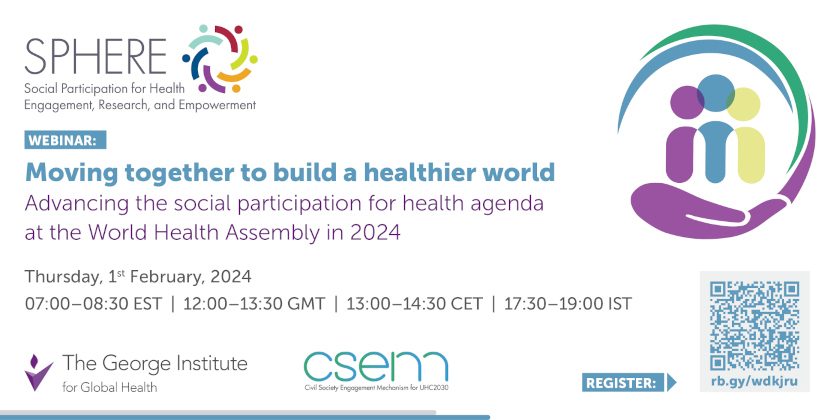
Moving together to build a healthier world: advancing the social participation for health agenda at the World Health Assembly in 2024

As the world marches out of the shadow of the COVID-19 pandemic towards Agenda 2030 and the goal of ‘leaving no one behind,’ the old dictum of ‘nothing about us without us’ is particularly salient. The pandemic has highlighted the need for participatory governance in health to foster inclusive and equitable health systems that are trusted by communities. Social Participation for Health (SPH), relates to empowerment of people, communities, and civil society to participate in and thereby influence decision-making processes for health, has demonstrated gains and impacts in health reform processes, though there is room to build our collective understanding of it, given its varying contexts and forms.
The WHO Executive Board (EB) met from 22-27 January 2024 to set the normative agenda for the 77th World Health Assembly (WHA). At the same time, under the leadership of Slovenia and Thailand, Member States are pursuing a resolution
on ‘social participation for universal health coverage, health and well-being’ that will be adopted at WHA. Now is the time for civil society to hold our leaders accountable for their promises..
The briefing will convene experts in public health and community empowerment for an exchange of best practices and learnings from SPH efforts-to-date, with a view to developing action-oriented recommendations and consensus for collective action ahead of the proposed WHA resolution. It will underscore the importance and relevance of SPH while also informing the public, communities, and civil society on opportunities to influence ongoing negotiations on the resolution, and how to get involved and support it this year and beyond.
Date: Thursday 1st February 2024
Time: 07:00-08:30 EST/ 12:00-13:30 GMT/ 13:00-14:30 CET/ 17:30-19:00 IST
Format: Online
According to the 2023 Global Monitoring Report published by the WHO and the World Bank, more than 4.5 billion people lack access to essential health services and 2 billion face financial hardship when accessing them. These aren’t just numbers; they represent the daily struggle of billions of people around the world who are denied the right to health, well-being, and dignity. This distressing state, which spans all regions and most countries, underscores the urgent need for inclusive and equitable health systems that leave no one behind. This requires the involvement of all stakeholders including civil society and communities in decision making.
At the United Nations High-level Meeting on UHC in September 2023 world leaders renewed their commitment to accelerate progress towards achieving UHC and the Sustainable Development Goals (SDGs) by 2030. In the political declaration, world leaders committed advancing social participation “involving all relevant stakeholders, including local communities, health workers and care workers in the health sector, volunteers, civil society organisations and youth in the design, implementation and review of universal health coverage, to systematically inform decisions that affect public health, so that policies, programmes and plans better respond to individual and community health needs, while fostering trust in health systems.”
Event objectives:
- Mobilise civil society to build political support for a WHA resolution on social participation in the decision-making process for health in countries.
- Share updates on the WHO Executive Board and opportunities for civil society to get involved in the lead-up to the WHA.
- Inform civil society about global and country-specific experiences regarding social participation in decision-making related to health, including the scientific evidence, and discuss recommendations for further advancing both.
Agenda:
(all times are displayed in CET)
13:00-13:10 Welcome and introductions – Devaki Nambiar
13:15:13:40 What we know about Social Participation for Health(SPH)
- Country experiences of SPH
- An update on the scientific evidence on SPH
13:40-13:50 Q&A/discussion
13:50-14:10 Civil society priorities towards institutionalising social participation in 2024 and beyond - Lara Brearley and Laura Philidor
14:10-14:25 Q&A/discussion
14:25-14:30 Summary and closing remarks – Devaki Nambiar
Confirmed speakers:
- Dr Belgacem Sabri, Director of the Tunisian Association for Defense of the Right to Health
- Devaki Nambiar, Program Director, Healthier Societies Strategy at the George Institute for Global Health India
- Laura Philidor, Policy Advocacy and Communications Officer, Civil Society Engagement Mechanism for UHC2030 and WACI Health
- Lara Brearley, Consultant, World Health Organization (WHO)
- Nanoot Mathurapote, Head of Global Collaboration Unit, National Health Commission Office, Thailand




